Interviewed and Written by Patrick Mc Gavin 8/10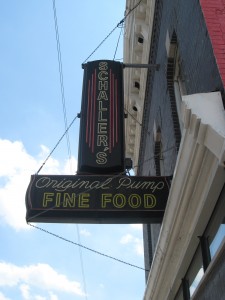
JACK SCHALLER ~ SCHALLER’S PUMP
A LEO STORY OF MEN GIVING BACK
It could be a scene from a play, or a movie.
It’s a beautiful late summer afternoon. A weekday. A group of older, clearly distinguished gentlemen, friendly and at ease with each other congregates in the back of a restaurant.
It’s the South Side of Chicago, in a neighborhood commonly mistaken for Bridgeport, but one actually called Canaryville.
The name sounds like a Mafioso’s worst nightmare, a meeting for the damned where those who formerly sinned tried to go straight and sang their way to a happier life. For wholly different reasons, the name is perfectly apt. The atmosphere is all about talk, voluble, ecstatic and off the wall. It’s privileged, in a way, but of course, anything goes here.
Even a stranger in their midst (wielding a pad and paper nonetheless) does little to dampen the nature or spirit of the discussion. These men, alternately funny, cajoling, prickly, are not afraid to say whatever’s on their minds, whether the subject is politics, baseball, or more frequently, navigating their collective memory.
Their connection is a school. All the men are graduates (in one hilarious case, honorary) of Leo High.
They fought in wars. They survived, they returned home and they have prospered, on their own terms. Of the seven seated at the long table, they range in age from their mid-sixties to the two respective elder statesmen, Louis Knox and Jack Schaller, both aged eighty-six years old.
They know each other through different ways, families, neighborhoods, or churches. Their primary connection is a school. All the men are graduates (in one hilarious case, honorary) of Leo High.
Mr. Knox, dapper, charming, even a bit rakish, clearly has a reputation that precedes him. He’s known as a bloodhound and a man who clearly enjoyed his time living on the other side of the clock. He was clearly a throwback, a man who brushed up against the less mannerly and perhaps unsavory side of the law. His nocturnal habits made him a mystery. “We always wondered when you ever used to sleep,” Don Hogan says.
His rambunctious nature and reputation as a hell raiser was known wide and far. He clearly enjoyed the attention. “We were at this function, and a woman came up to me and said: ‘My husband is banned from going out with you,'” he said, revealing a casually sideways grin and moment of recognition.
His face, weathered, lined, evocative, was as telling as his friendly manner and ease at telling a story. “I stormed the beaches at Anzio, scaled a cliff in the south of France,” he says. The other friends picked up the tale. He was the first GI in Rome, one of the men says. “A guy from Stars and Stripes interviewed me, and that’s what he said,” Mr. Knox says.
 Before we get ahead of the story, it is worth mentioning the fine establishment the men have settled is the legendary Schaller’s Pump, at 37th and Halsted. It’s an enclave, in the sense no matter how much the world around us changes, this place is literally frozen in time. It’s located in the heart of the neighborhood, a redoubt of bare-knuckles, old-fashioned Chicago politics. The restaurant sits across the street from the 11th ward Democratic headquarters.
Before we get ahead of the story, it is worth mentioning the fine establishment the men have settled is the legendary Schaller’s Pump, at 37th and Halsted. It’s an enclave, in the sense no matter how much the world around us changes, this place is literally frozen in time. It’s located in the heart of the neighborhood, a redoubt of bare-knuckles, old-fashioned Chicago politics. The restaurant sits across the street from the 11th ward Democratic headquarters.
Its history is also about the birth of the Chicago speakeasy, the rise of the Chicago outfit, supplanted by neighborhood politicians and, in the case of the legendary Mayor Richard J. Daley, a national kingmaker. The Volstead Act that outlawed liquor consumption and enacted Prohibition (1920-1933) only deepened the restaurant’s reputation and earned its notorious name.
During Prohibition, the Bridgeport brewery Ambrosia pumped their illicit stock, the underground clientele was permitted entry only once they were recognized or allowed in through a strategically placed peephole.
Mr. Schaller marks the third of what is now the fourth generation of Schallers to run and manage the restaurant. Mr. Schaller and his wife, Betty, had three sons and five daughters. Mrs. Schaller passed some fourteen years ago. “We were married fifty-two years,” he says, wistfully. Mr. Schaller has eighteen grandchildren and three great-grandchildren.
All of his children are either currently or at one time have had a hand in running the family business. It’s passed through time. Mr. Schaller’s grandfather, named George Schaller, a Bavarian émigré, founded the restaurant in 1881. “For the first fifty years, probably, the restaurant was just where we are now,” he says, pointing to the backroom where the group of Leo graduates are assembled. “Then the front was added, later.”
His grandfather was known as Harvey, “after a horse,” Mr. Schaller says. His father, also named George, was called Schultz. His older brother was also called George. “I wish you could have known my brother George,” he says, his eyes now gleaming, “he was some kind of guy. He had his own orchestra.” (Mr. Schaller also had a sister, Mary Jane. He is the only living relative among his siblings.)
“My dad,” he says, “ran the bar, but his real business, he was a bookmaker.” Asked whether Al Capone ever turned up there, Mr. Schaller shook his head. “No, this wasn’t his territory.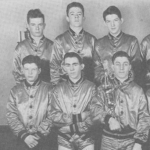 But my mother, she used to go see a doctor over on 24th and State, and Capone was also there. She’d go up to the doctor’s office, and there would be all these huge guys in the lobby, Capone’s bodyguards,” he says.
But my mother, she used to go see a doctor over on 24th and State, and Capone was also there. She’d go up to the doctor’s office, and there would be all these huge guys in the lobby, Capone’s bodyguards,” he says.
The establishment is, according to official lore (and Chicago records) the oldest continuously operated restaurant in the city. It was thought to have the oldest liquor license. “No,” Mr. Schaller says, emphasizing the point, “my grandfather sent me down to get the license and we were number three on the list.”
The family originally lived near the bar, and Mr. Schaller was born in the neighborhood. “We moved to St. Sabina about the time I was three years old,” he says. Leo was a natural destination. Outside of Mr. Schaller’s involvement playing for Brother Finch’s legendary lightweight basketball squads that put together a memorable winning streak, very little held his attention.
Having a family business to fall back imbued Mr. Schaller with a feisty temperament and iconoclastic nature. The Brothers at Leo held little sway over them. “They couldn’t do anything to me,” he says, proudly, “because I always knew I had this,” ending it with a flourish by softly striking his hand on one of the bar tables.
He left Leo after his junior year. About a year after the Japanese attack at Pearl Harbor, Mr. Schaller received his draft notice.
“I went down to take my physical, and I thought it was an Army doctor, but he passed me over to this other guy and he turned out to be Navy. I’ll never forgot I did the physical and later, I saw him write down in red ink ‘NAVY.’ I got mad and said, ‘If I wanted to go into the Navy, I would have signed up for the Navy.’ It didn’t really matter. Even though I was Navy, I was not on a boat. I was in the infantry and I spent two and a half years in the Philippines.
“I was lucky,” he says.
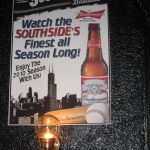 He acts out what happened on the island, showing how he arrayed his body flat on the ground as the dust and debris swirled around his head. “I could feel the bullets graze both sides of my body, left and right. If the Japanese moved the machine gun half a click either way, they’d have gotten me right on the back.”
He acts out what happened on the island, showing how he arrayed his body flat on the ground as the dust and debris swirled around his head. “I could feel the bullets graze both sides of my body, left and right. If the Japanese moved the machine gun half a click either way, they’d have gotten me right on the back.”
He wears a hat, emblazoned “World War II veteran,” on it. “I can’t tell you how many times somebody has seen me with the hat, they’ve come up to me and just said, ‘Thank you.'”
In Chicago, perhaps more than any other major city in the country, it really matters where you went to high school. It’s a big deal; it’s not just a connecting thread, but a personal statement about loyalty, identity, friendship and trust. It is why Mr. Schaller, with his friends like the brothers Farnan, John (Jack) and Bill, still avidly attend a lot of Leo basketball games, at home, on the road, or even neutral sites.
Jack Farnan came out of the class of 1963 and he served in Vietnam. His brother Bill graduated a year later. They grew up a stone’s throw from the restaurant. “As far as high school, we really had two choices, either Ignatius or Leo,” Jack Farnan says. “I told this story to my daughter. She just graduated from grammar school and she was trying to decide where to go to high school. It was a difficult decision. I really wanted her to go to Ignatius, but all of her girlfriends were going to Queen of Peace.
“The night before she was going to take the entrance test, she comes to me, very seriously, and she says, ‘Dad, I really need to know how you made up your mind about school.’” He paused, for excellent dramatic effect.
“I said, ‘I decided on Leo because we had a better football team.’”
As the upstart to Mount Carmel and St. Rita, Leo might have been borne in their shadow, but they quickly established itself as equals on the playing fields, especially the only two sports that really mattered back then: football and basketball. Mr. Hogan and his brothers were legendary for their basketball prowess and their sterling record at the St. Sabina house league. Mr. Schaller was a pugnacious young guard on those lightweight teams coached by Br. Finch.
Much has been made of the social transformation of Leo and the Auburn-Gresham neighborhood. People are complicated, and the stories of these gentlemen reflect that. The Leo of today bears little recognition perhaps, but they still identity strongly with the values, principles and beliefs.
The case of Mr. Farnan’s paralleled that of his friends this day. If the pride of a Catholic League powerhouse football team propelled him there, an enduring and great basketball program and competitive football team coax him back, again and again. “There were some years we went to every single game,” he says, “home, on the road, it didn’t matter. Those great teams that Fitz [former coach Jack Fitzgerald] had in the mid and late-eighties, we never missed one.
“Fitz would start out at the Quincy tournament for Thanksgiving, and we’d drive up there and then go visit an aunt in St. Louis.” Basketball has its own glorious history, especially as practiced at Leo. In the first half of the school’s existence, the pride was found in Catholic League supremacy and the fast, overpowering and dominant play of the lightweight teams. As the players got bigger and the five-foot-eight and under division was phased out, the new primacy was city and Catholic league championships.
Mr. Farnan was not willing to make a declarative statement, but he admits the 1973 Tom O’Malley coached team led by star Tony Parker is probably the greatest Lions’ team ever. They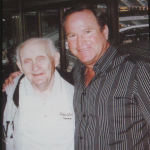 won thirty-five out of thirty-seven games, won the Catholic League and finished second to mythical national champion DeMatha in suburban Maryland in a tightly contested national Catholic tournament.
won thirty-five out of thirty-seven games, won the Catholic League and finished second to mythical national champion DeMatha in suburban Maryland in a tightly contested national Catholic tournament.
It was the last year the Catholic League teams played outside the public league and suburban schools that made up the Illinois High School Association (IHSA). Public League champion Hirsch, a neighborhood rival, won the state championship but the planned showdown with Leo never came to be. To this day, whether rightly or not, legend has it Hirsch used security concerns as a pretext to get out of playing the game. “[Hirsch star guard] Ricky Green was afraid of us,” Mr. Farnan says.
Then the Catholic League programs were woven into the IHSA and they became eligible for the state tournament series. As Leo traveled, their fan base stayed the same: passionate and supportive. In 1996, the state final tournament was shifted to Peoria from Champaign. The 1998 Lions team beat a very good St. Francis de Sales unit to qualify for the Class A quarterfinals. The Farnans and Mr. Schaller were among the fans that made the trip.
Times change, but people and their allegiance rarely do, especially on the subject of high school basketball (or football, for that matter). “We were all dressed in our orange and black, and we met these people from Quincy Notre Dame and they asked who we were with and we said, ‘Leo,’ and they couldn’t believe it,” Mr. Farnan said.
However incongruent it may have appeared, it was wholly logical. Blood runs a lot thicker than color. When the Lions 2004 team, coached by 1995 alumnus Noah Cannon, won the state championship, they were there.
One of the ringleaders in organizing the gathering was Gene Earner, a bear of a mind, though certainly sweet and proud. His connection to Leo is one of the first things you discover about him. The license plate of his 1991 Cadillac reads: “Leohigh.” Going to Leo is one of his fondest (and earliest) memories. He remembers going there as a three-year-old with his older brother, a 1939 graduate. Mr. Earner grew up in the parish at St. Margaret of Scotland. He graduated from Leo in 1950.
About the license plate: Mr. Earner returned to Chicago from Florida four years ago following the passing of his wife, Donna. “I called up the state and I asked for, ‘Leo50,’ but the woman I spoke with said it was not available. She said, ‘I can give you ‘Leo57,’ and I told her, ‘That number has no significance for me.’
“I thought for a minute, and I said, ‘What about Leohigh,’ and she asked how do you spell high and I told her, and she said I could do that. Mr. Earner and his wife Donna had twelve children, and nine were boys. The oldest three sons attended Brother Rice. The final six all graduated from Leo. His youngest son Brian, class of 1993, was one of the final white students to graduate from Leo.
During the lunch, Mr. Earner pulls out a group of photos, including one from his son’s freshman year at Leo, where he is the only white player on the basketball. The young boy’s smile is deeper than a canyon, suggestive perhaps not only of his happiness but also at how he was accepted.
During the nearly twenty-years that Mr. Earner and his wife had a son at Leo, he worked in dual capacities as the public address announcer for the football games and the clock operator for the basketball games. It was trial by fire, but he acquitted himself well. “I never went to college,” he says. “I went to work right after I graduated from Leo.”
He performed admirably in his job, using his smarts, diligence and ingenuity to handle the different obstacles. “When we first started at Gately Stadium, there wasn’t really an announcer’s booth and I’d walk the sidelines, but we didn’t have a [cordless] microphone, so I had a carry one with this long cables and extension and try to make sure that one of the players or a manger would step on it, or we’d lose the power,” he says.
He never missed an assignment in his nineteen years, despite his other family obligations and working eighty-hour shifts as a driver for the Canfield beverage company. He also was left undeterred after he suffered an industrial accident at Canfield, a bottle exploded near his eye that caused him to lose most of his vision out of that eye.
“It was something I learned from my dad, doing a lot of things at once,” he says. “He was involved with the American Legion out in Blue Island, and there was a circus out there and he’d run the carnival and it meant he’d have to get up at like four o’clock in the morning.”
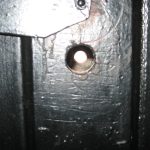 He also developed the necessary fortitude and toughness to withstand just about anything, although a couple of times he almost went over the edge, by his own admission. “Loyola came over to play us in basketball, and it was a really close game. In fact, it went to overtime. The clock was sometimes tricky, and you had to reach around to play with it. Anyway, I reset the clock for the overtime and Leo ended up winning, but it was close, and there were Loyola coaches who complained and they started yelling and swearing at me, so I got up and started saying stuff back.
He also developed the necessary fortitude and toughness to withstand just about anything, although a couple of times he almost went over the edge, by his own admission. “Loyola came over to play us in basketball, and it was a really close game. In fact, it went to overtime. The clock was sometimes tricky, and you had to reach around to play with it. Anyway, I reset the clock for the overtime and Leo ended up winning, but it was close, and there were Loyola coaches who complained and they started yelling and swearing at me, so I got up and started saying stuff back.
“Next thing I feel, somebody puts their arm around me and just picks me up and carries me across the gym before anything else happened. It was Bob Foster.”
Mr. Schaller, by the way, enjoyed his own delayed gratification. He dropped out of Leo after three years during the war. Four years, after some prodding and help from friends, he received his Leo diploma. It’s framed on one of the doors at the restaurant. Close by is a photograph, of Mr. Schaller in the front row, of the famed light teams that put together a prodigious winning streak back in the day.
Forget Thomas Wolfe: these gentlemen and their friends prove you can always go home. There are the occasional alumni organized fundraisers and outings that typically involve returning to a school to see a game, like this year’s showdown with Brother Rice that had some two hundred or so Leo alumni in attendance.
The Farnans and Mr. Schaller still go on their own volition, in small groups or larger gatherings. They no longer attend every Leo game, but they are still present. The hardest part for Mr. Schaller is navigating those hellacious three flights of stars to gain entrance to the gym. One old-timer, believed to be the oldest surviving Leo alumnus, a man in his nineties, was seen in the second row earlier this year when the Lions played at St. Laurence.
The gentlemen make allowances, going to schools with slightly more accommodating seating, like at Hales or the Big Dipper Tournament at Rich South in Richton Park. “We just pick the best game of the week and that’s where we decide to go,” Mr. Schaller says. Sometimes the location is”enemy’s lair,” like De La Salle or St. Rita, but the friendship, camaraderie and good times endure.
After enough time passed, several of the gentlemen had to leave to make other appointments. Near the end, a tall, unfamiliar fellow approached the table. “I heard there were some Leo people back here,” he announced. “Anybody from the class of sixty-three.”
You just missed a couple, Mr. Hogan says.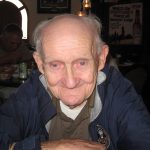
He stood there, admiring, clearly at the devotion and the connection of these older men. He was actually an Ignatius man, he admitted. After the side talk about neighborhoods and parishes, it came back to brass tacks, as it were.
“Leo,” he said, almost shaking his head, the nightmares returning. “We could never beat you.”
The gang eventually broke up, in pairs, except for one smaller subgroup, that repairs to the front of the bar for a final drink. Before the men separate, there is more talk and plans being sketched for another get together, sometime soon, golf, maybe, a Sox game, a reunion.
it is one promise you need not worry being broken.
Speak Your Mind